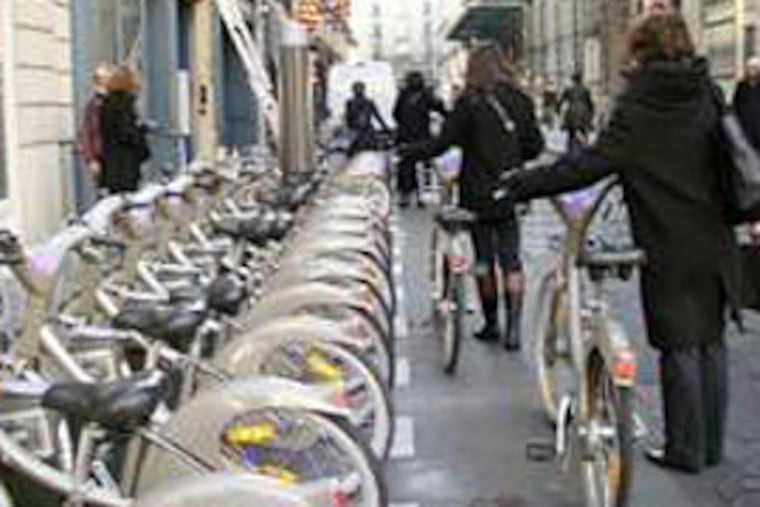Promoting bike-sharing in Philadelphia
A community activist hopes to spark a bike sharing program in Philadelphia, similar to one in Paris where streets teem with people peddling free-use bicycles.

If you've visited Paris recently, you will have noticed the streets teeming with people, all kinds of people, riding bicycles.
Pensioners with baguettes wedged into the handlebar basket. Lawyers and businessmen with briefcases. Well-dressed women, (but of course), in high heels.
The bikes are gray, clunky workhorses with fenders, fat tires and comfortable seats. Despite appearances, they are high-tech, equipped with antitheft and global positioning devices and they represent the wave of the future. Or so many, including Philadelphia community activist Russell Meddin, hope.
Meddin, 57, has helped organize a public forum, to be held at 6 p.m. tomorrow at the Academy of Natural Sciences, with the hope of starting a bike-sharing program in Philadelphia.
Paris launched its program, Velib, in July with 10,000 virtually free-to-use bikes. Ever since, Parisians have experienced a coup de foudre (passionate crush, what else?) over this new way to get where they need to go. There are now more than 20,000 bicycles in the fleet, electronically locked in more than 2,000 automated parking stations. With a deposit of $225, you register for short- or long-term use. A one-day pass costs about $1.50, a weekly pass $7.50, and an annual subscription $44 with no extra charge for rides less than 30 minutes. Users swipe a credit or subscription card at an ATM-like machine to release the bicycles. Additional charges are automatically deducted for extended rentals: $1.50 for the first extra half-hour, $3 for the second, and $6 beyond that.
Other cities have different arrangements and, with smaller fleets, annual subscription costs may be much higher - as much as $250.
The idea that Philadelphia, with its oppressive traffic, reckless drivers, rampant thieves, vandals and other assorted miscreants, would behave honorably enough to sustain such a system may seem dubious. Too kind? All right. An absurd, unthinkable, are-you-kidding bad joke.
But cities with problems as bad as Philadelphia's have pulled it off, Meddin says.
In most cases, theft is averted by the need for a credit card to get into the system, plus the bicycles contain GPS devices to track where and by whom they have been taken. They are designed so that their parts are unique and can't be easily jerry-rigged onto mainstream models. And, particularly in cities with large-scale programs, would-be thieves have little incentive to steal a bike because they are plentiful and virtually free to use.
Meddin first witnessed bike sharing in 2006 when he visited his daughter during her junior year abroad in Lyon.
"I saw the future," he said. "This could solve some of our problems." Reduce traffic congestion in Center City, encourage healthier lifestyles, improve the air quality, save people money and time.
"You can ride to most places on a bike through Center City in 10 to 15 minutes less than by car during rush hour," he said based on personal experience.
Pittsburgh has a small program, 30 bicycles available for recreational rides along riverside bike paths. Rome is about to start one. Beijing, San Francisco and Portland, Ore., are considering plans and so is Chicago, whose mayor, Richard Daley, tested a Velib velo in Paris last summer and came back a fan.
There are a variety of ways to pay for the programs, which grew out of informal "painted bike" arrangements on college campuses in the 1970s.
Paris' program was financed by giving the multinational corporation JC Decaux the rights to advertise on billboards and public furniture - bus shelters, benches, public toilets - throughout the city.
Clear Channel and Cemusa have sponsored bike-sharing in Europe as well.
"This is the kind of business that lends itself well to public/private partnerships," says Katie Schwab, director of government relations for Cemusa, a subsidiary of FCC, a public-furniture company in Madrid. Her company participated in a pilot project in New York City last summer.
Larger programs have a better chance of success, says Martina Schmidt, president of Clear Channel Adshel, which sponsored its first bike-sharing program in 1998 in Rennes, France, and which will launch one in Washington later this year.
"Cities here have to understand that they need a critical mass," says Schmidt, who will attend the Philadelphia forum tomorrow. Interest tends to build quickly and, with too few bicycles, she says, people become frustrated. Local governments or bicycle groups "need to do research and planning so that the programs become an extension of an existing public transportation system. You get out of the subway and pick up a bicycle to transfer to a bus or get to a final destination. If customers start to rely on it, it becomes a part of their everyday life."
Though it may seem that there's little not to love in a public bike-sharing system, involvement by such corporate goliaths has its drawbacks, opponents say.
"Multinational corporations get carte blanche to put advertising on illuminated billboards throughout a city," says Michael McGettigan, a lifelong bicyclist, cycling advocate, and owner of Trophy Bikes in West Philadelphia.
McGettigan argues that cities should look for ways to make bicycling safer and more accessible to the thousands of cyclists who are already trying to get around on two wheels.
Important points to be considered, Meddin says.
Still, he believes, it would be hard to institute a program without corporate involvement. The initial investment, he estimates, would be about $10 million. But worth every dollar, he says. In Lyon, he says, traffic congestion was reduced 8 percent after the bike-sharing program took off.
"I think there's a new world out there. People are interested in doing things that are green. It's a win-win-win-win situation."
To see a video explanation of Paris' bike-sharing program, go to http://go.philly.com/velib EndText